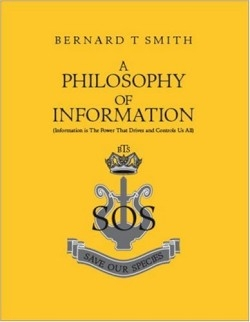A Philosophy of Information
(Information is The Power That Drives and Controls Us All)
The current era has been called “The Age of Information,” and much attention is given to the development of faster, more effective, and even more stylish ways to store, retrieve, and transmit that information. But beyond decisions about what new gadget to acquire lies a more pressing issue: the meaning, intent, and effect of the information being transmitted, and its deeper implications for individuals and for the larger world.
Author Bernard T. Smith avers that one of the main lessons of human life is learning “how to cope with an infinite mass of information, knowledge, and mystery,” and that information is the “most potent agent in nature and, equal to life itself…” Although intangible, information is one’s reality, and Smith states that, “Nothing is really known to exist until information about it is passed through a human mind.” Information affects one’s life for good or for ill depending upon its content, its truth or falsehood, and the use one makes of it; without it life is impossible, and from the cellular level to the far reaches of the universe, effective transmission of the necessary information is imperative.
The author, who lives in the United Kingdom, has worked with computers from their earliest beginnings, designing information systems and writing software. He writes from intimate knowledge of information technology and is able to take complex technical topics and present them in a manner that is engaging and accessible to average readers.
Since information defines reality, and since it is easily manipulated by anyone with sufficient access and motivation, understanding its nature and meaning is vitally important. Comparing and contrasting the functioning of computers with the way the human brain works, Smith makes readers aware of the blessings and dangers inherent in this “information age,” and has much to say about the effects of technology on daily life: “Nowadays, with a mobile telephone in the back pocket, the magic has gone….Information at the finger tips is not an unmitigated blessing. Our lifestyles, and maybe our spiritual yearnings, are turned upside down because of it. We could be becoming a different kind of being, something not quite human.” Indeed, the manipulation of human DNA, the “basic blueprint of life,” is “the greatest test yet facing us in the handling of information,” and a wide range of benefits and horrors could be made possible through modifications made to the information carried in human genes.
Bernard T. Smith invites readers to become part of a vitally important discussion; recognizing that the “Information Age” has brought many blessings, he also brings to light the potential for the manipulation of individuals and populations to their detriment. A more engaging title might carry his invitation to a wider range of readers and include those not particularly drawn to philosophy; they too need to be aware that the relationship between human beings and information has a dark side, and that to ignore this is to risk the survival of humanity.
Reviewed by
Kristine Morris
Disclosure: This article is not an endorsement, but a review. The publisher of this book provided free copies of the book and paid a small fee to have their book reviewed by a professional reviewer. Foreword Reviews and Clarion Reviews make no guarantee that the publisher will receive a positive review. Foreword Magazine, Inc. is disclosing this in accordance with the Federal Trade Commission’s 16 CFR, Part 255.

